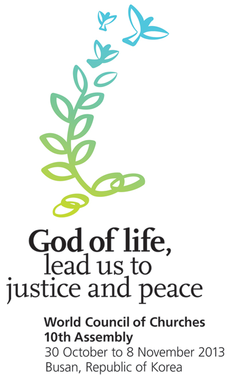“No one can serve Christ and caste!”

Rev. Sunil Raj Phillip (right) shows caricature of an assembly participant at the WCC assembly in Busan.
07 November 2013
*By J. Ayana McCalman
The National Council of Churches (NCCI) in India has taken a firm stand against casteism and caste discrimination in India. The NCCI Commission on Dalits is exhibiting materials about its campaign “Solidarity with Dalits for Justice and Dignity” in the Madang Hall at the World Council of Churches (WCC) 10th Assembly. The NCCI Commission on Dalits has also created a unique way of raising awareness about casteism.
The WCC assembly is currently underway in Busan, Republic of Korea, continuing until 8 November.
Rev. Sunil Raj Phillip, executive secretary of the NCCI Commission on Dalits, is leading discussion at the exhibit. Assembly participants are invited to “Discuss caste over a caricature.” Rev. Sunil facilitates an engaging discussion about the struggles of Dalits for freedom for justice while drawing a caricature. Phillip describes casteism as the greatest evil in India.
Based on a reading of Matthew 6:24 and in the context of caste division, caste discrimination and caste violence in India, the NCCI has made an affirmation of faith to declare: No one can serve Christ and caste! The faith affirmation was formulated in the National Ecumenical Conference on Justice for Dalits convened by the NCCI in partnership with the WCC in Delhi in 2010. There are an estimated 200 million Dalits in India today, and they comprise 17 percent of the population. Phillip, who is a Dalit himself, explains that “the term ‘Dalit’ means oppressed, broken and crushed. Dalits call themselves this term to denote both their struggles and resistance.”
Atrocities against Dalit women
Each day in India, on average, three Dalit women are raped. Each year there are more than 27,000 incidents of serious atrocities and human rights violations against Dalits registered under the Scheduled Caste/Scheduled Tribes (Prevention of Atrocities) Act 1989 in India. The atrocities inflicted on Dalit women include rape, gang rape, rape of minor girls, murder, and assault. Dalit women are the prime victims of violence against the Dalit community. From 1 to 3 October 2013 the NCCI hosted a seminar on “The Lives and Challenges of Dalit Women in the 21st Century.” The fifty women and men who gathered at the seminar have committed to document violence done against Dalit women, to provide strategic plans for Dalit women to voice against violence as well as for the churches to raise prophetic voice on behalf of them” among other practical actions.
The “Solidarity with Dalits for Justice and Dignity” exhibit at Booth 77 in the Madang Hall at the WCC assembly provides information and resources about the Dalits struggle for justice and peace. Participants at the assembly can visit the booth to learn more about the Dalit struggle and get their caricature done free as a memento of Busan.
*J. Ayana McCalman is a lawyer and a missionary for the Council for World Mission (CWM). She works for the United Congregational Church of Southern Africa as communications and justice advocacy officer.
Affirmation of Faith on Justice for Dalits
National Council of Churches in India
Official website of the WCC 10th Assembly
High resolution photos available via photos.oikoumene.org




